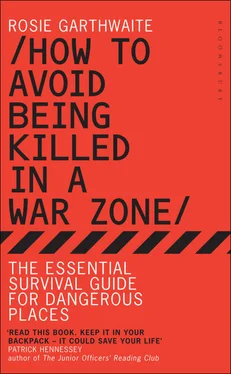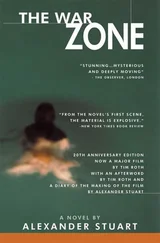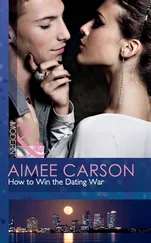On top of these essentials there are some other bits and bobs I always take along on any trip to make life a little easier:
• Baby wipes – several different brands so that no particular smell becomes associated with a bad time. If that happens, it will limit your choices next time.
• Couple of sarongs – as quick-dry towels, emergency headscarves, skirts (manly ones too, as per David Beckham), dresses, cover-ups, pillows, curtains, extra blankets, useful medical equipment for bandaging and tying on splints, and a crucial layer between you and dirty, smelly hotel sheets when you need one.
• Space blanket – useful to stay warm, and the orange-gold side can be used as a signal (that colour doesn’t occur naturally in the wilderness). Plus, they fold to the size of a hankie.
• Hot-water bottle – can be your best friend in a cold climate. Boil up your water, wait 30 seconds, then pour it into the hot-water bottle. When you wake up in the morning you have water that is safe to drink and at body temperature rather than freezing cold.
And, depending on where you are travelling, some other useful things that can be difficult to find in a hurry should also go in your bag:
• Tin opener
• Duct tape
• String
• Bin bags
• Puritabs/water sterilizing tablets
• Toilet paper
• Vaseline or the cure-all Australian remedy Lucas’ Pawpaw Treatment
• Tweezers
• Eyedrops
• Soap
• Candles
• Washing liquid
• Sewing needles (of different sizes) and thread
Whether you are a girl or a boy, there are some quick lessons to learn about underwear under fire. You need to be able to get up and go straight from your bed to the fire escape if necessary. Leave your posh pants at home. Stefanie Dekker, an Al Jazeera English producer, remembers: ‘I was in Kurdistan and in most of the hotels guys do the laundry. I put all my pretty G-strings in the laundry and came back to my room to see them lined up, drying on my windowsill. Then two guys arrived at my door, one of them from the laundry, big grins on their faces: “Anything else you need, madam?” It felt very awkward. Now I travel with only big pants.’
Stefanie also notes: ‘Remaining professional-looking can be a struggle when there is little water to wash with for weeks on end. I usually take dry shampoo with me. It is a powder spray, which absorbs all the dirt and gives your hairdo a little extra oomph. It’s like a shower in a can!’
Optional extras
There are plenty of other optional extras, not so much for your grab bag, but equally important for remaining safe and sane. Here are some tips from the top.
‘Good pair of sunglasses.’
Shelley Thakral , senior producer, BBC World
‘iPod – being able to take photos of family and music on my travels has changed my life.’
Jon Snow , chief news presenter, Channel 4
‘Books – lots of them. Also cigars and good whisky.’
John Simpson , world affairs editor, BBC News
‘Plenty of aspirin and painkillers.’
Subina Shrestha , journalist and film-maker
‘Cheque book. This works a treat with the hawala system [an informal money-loaning system based on honour and found mainly in the Arab world]. Go to a money-changer and write a cheque – just the sterling amount and a signature are required; the payee and date are left blank – and you are given the equivalent in US dollars. The system works across south Asia and much of the Arabic world.’
Ian Mackinnon , freelance journalist
‘Penicillin, two passports and a means of communication.’
James Brabazon , journalist and documentary film-maker
‘Booze – great for winding down after a day of human suffering and hopelessness. Also Vegemite – it makes anything taste better.’
Laura Tyson , former media officer, Department for International Development
‘Sat nav and maps, but leave the sat nav behind if you are off to somewhere sensitive. Small generator that produces 220 volts of electricity. Gifts to win people over: chocolate is great for kids, while small solar-powered panels to charge mobiles are cheap and priceless to adults. Camelbak-style water container. Torches with plenty of batteries for when the electricity is down.’
Leith Mushtaq , senior Al Jazeera cameraman
‘Condoms, peanuts, water-bottle, torch, long- and short-sleeved shirts, anti-mosquito repellent, a small bottle of gin or vodka that will not get spotted in a Muslim country where booze is forbidden. Vodka in an IV bag is the best!’
Monique Nagelkerke , MSF head of mission
‘Good book and a head-torch to read it by. Sleeping mat or a sleeping bag as it can get very cold at night.’
Tim Albone , journalist
‘Music on my iPhone, shortwave radio, snakebite kit (in the wilds of Southeast Asia), and a US army escape kit (in Vietnam).’
Jon Swain , journalist and author
‘Army tourniquet, clean needle, antiseptic, water purification tablets and portable chess set.’
Sebastian Junger , journalist and author
2/ Avoiding Misunderstanding
There is no such thing as an enemy. You are independent in a war zone: you should be able to deal with everyone and everything. Understand that the people outside are just men and women. How are they thinking? What part of them can you understand? In the end they are all human. You need to find the kernel of humanity.
Leith Mushtaq
At the risk of sounding likea beauty pageant contestant, if everyone could approach the unfamiliar with the same sensitivity and lack of preconceived judgement as Leith Mushtaq, a world of violence and death could be avoided.
Unfortunately, when two people meet they bring their baggage with them – fears and notions of otherness that lead to dangerous misunderstanding. All we, as visitors, can do is to try to bridge the canyon of difference. There are many different ways to do that, from speech to looks and body language.
John Simpson, the BBC correspondent who has sat on many a front line, says you always need to retain your ‘self’. ‘Act naturally, don’t allow yourself to be scared; be friendly, look people in the eye and never, ever try to pretend you’re not who you are.’
Kamal Hyder has spent years working as a journalist in the tribal lands of Pakistan and Afghanistan. His reports are as popular with the Taliban as they are with the Pakistani Army. He advocates learning how to blend in with people in any way you can. ‘Even if you can’t assimilate, you can learn how to treat people, show respect for their culture. You should aim for them to respect you as much as you respect them. Engage them on their level.’
There are two very different schools of thought about blending in, and both sides feel equally strongly.
I spent a lot of time in Iraq struggling with my abia , the black, all-in-one number that covers you from head to toe. Initially, I wore it to travel when visiting scary places in town, and to funerals. But I quickly learnt that it was never going to help me – a blonde-haired, blue-eyed girl – blend in. While other girls could go through an assault course in their headscarves, mine would not stay on. It was like the material and my head were magnetized at polar opposites. Wearing it just meant that people looked twice and often came up to me and asked who I was – the last thing I wanted.
A friend of mine, however, was able to wander freely around Baghdad without anyone batting an eyelid because she had brown eyes and brown hair. She had also perfected the art of dressing to blend in – carrying only plastic bags, never a smart laptop case. She wore local clothes, bought on arrival, and, most importantly, local shoes, and went quietly about her business. Our Muslim translators thought it was fantastic. The Christian was furious.
Читать дальше




![Джонатан Димблби - Barbarossa - How Hitler Lost the War [calibre]](/books/385421/dzhonatan-dimblbi-barbarossa-how-hitler-lost-the-w-thumb.webp)







